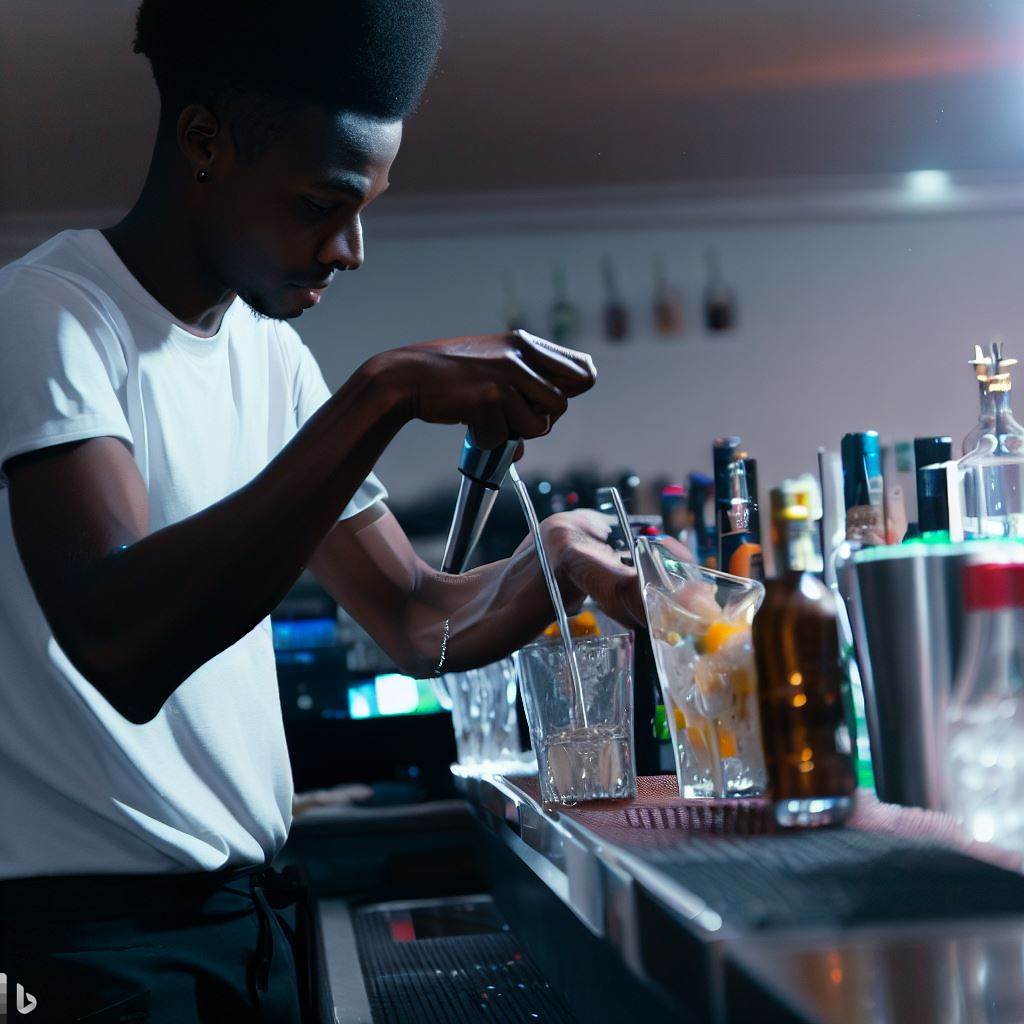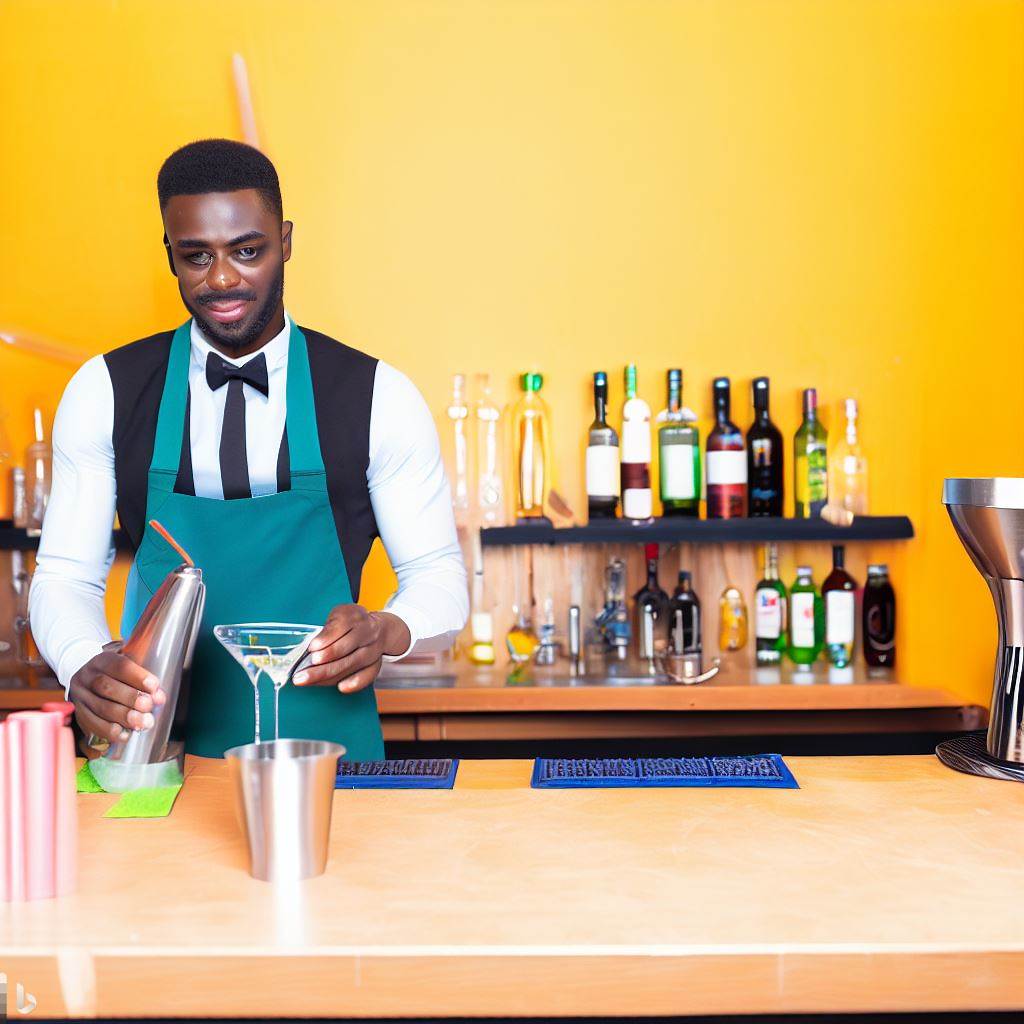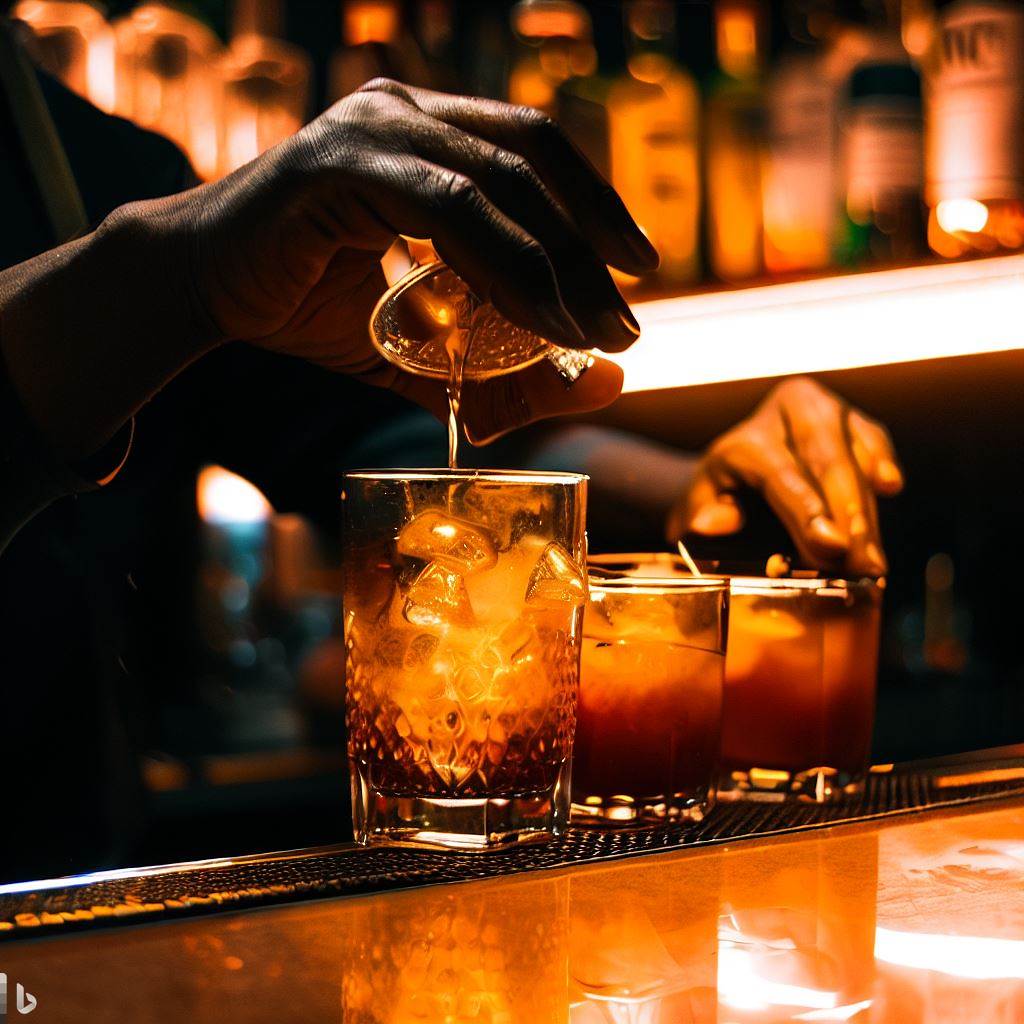Introduction
Bartending in Nigeria is more than mixing drinks; it demands a unique set of skills and adaptability.
- This blog post uncovers the essential skills needed for bartenders to thrive in Nigeria’s dynamic bar scene.
- From mixology prowess to exceptional customer service, we’ll delve into what it takes to succeed in this role.
- Whether you’re a budding bartender or looking to upskill, this post will guide you towards cocktail mastery in Nigeria.
Knowledge of Popular Drinks and Cocktails
Having a strong knowledge of popular drinks and cocktails in Nigeria is crucial for bartenders to succeed in their profession.
Customers often have specific preferences and expectations when ordering drinks, and being well-versed in the country’s popular beverages allows bartenders to meet these expectations and provide excellent service.
A. Commonly ordered drinks and cocktails in the country
Here are some commonly ordered drinks and cocktails in Nigeria:
- Chapman: This non-alcoholic drink, made with Fanta, Sprite, lemon-lime soda, grenadine syrup, and Angostura bitters, is a favorite among Nigerians.
- Pina Colada: This creamy and refreshing cocktail, made with rum, coconut cream, and pineapple juice, is often enjoyed at beach resorts and parties.
- Mojito: A classic cocktail made with rum, lime juice, sugar, soda water, and mint leaves, which is loved for its refreshing taste.
- Schapman: Similar to the Chapman, this drink contains Fanta, Sprite, grenadine syrup, and tropical cocktail flavors.
- Margarita: A popular tequila-based cocktail served with lime juice, triple sec, and sometimes topped with salt on the rim of the glass.
B. How bartenders can acquire this knowledge through training or research
Bartenders can acquire knowledge of these popular drinks and cocktails through training or research.
Several bartender training programs and courses are available in Nigeria, where aspiring bartenders can learn about the different types of drinks, ingredients, and mixing techniques.
These programs often cover the traditional Nigerian drinks as well as internationally renowned cocktails.
Additionally, bartenders can expand their knowledge by conducting independent research.
They can explore recipe books, online resources, and even attend mixology events and workshops.
By staying updated on the latest trends and innovations in the beverage industry, bartenders can offer unique and exciting drink options to their customers.
Furthermore, gaining practical experience through internships or working in established bars and restaurants can greatly enhance a bartender’s knowledge of popular drinks and cocktails.
This hands-on experience allows them to observe and learn from experienced professionals, understand customer preferences, and develop their own signature drink creations.
To succeed as a bartender in Nigeria, having a strong knowledge of popular drinks and cocktails is essential.
This expertise not only enables bartenders to meet customer expectations but also sets them apart as skilled professionals in their field.
Customer Service and Communication Skills
In order to succeed as a bartender in Nigeria, it is essential to have excellent customer service skills.
This is because the success of a bar largely depends on the satisfaction of its customers.
Effective communication with customers is also of utmost importance.
Bartenders need to be able to understand and fulfill the needs and preferences of their customers, as well as maintain a friendly and professional rapport with them.
A. Importance of Excellent Customer Service Skills
- Building customer loyalty: By providing excellent customer service, bartenders can establish a loyal customer base who will continue to visit the bar and recommend it to others.
- Increasing revenue: Satisfied customers are more likely to spend more money at the bar and even become regular patrons.
- Brand reputation: Offering top-notch customer service helps in building a positive brand image, which can attract more customers and set the bar apart from competitors.
B. The Role of Effective Communication
- Understanding customer preferences: By effectively communicating with customers, bartenders can determine their likes and dislikes, enabling them to make appropriate recommendations.
- Handling complaints: Good communication skills allow bartenders to address customer complaints promptly and efficiently, ensuring that issues are resolved to the customer’s satisfaction.
- Upselling and suggestive selling: Bartenders who communicate well can effectively promote specials, new drinks, and upsell high-margin cocktails, boosting sales.
C. Tips and Strategies for Enhancing Customer Service and Communication Skills
- Active listening: Pay attention to customers, show interest in their preferences, and provide personalized recommendations based on their feedback.
- Positive body language: Smile, maintain good eye contact, and project a friendly and approachable demeanor while interacting with customers.
- Efficient response: Respond promptly to customers’ requests, whether it’s taking their orders, refilling drinks, or addressing concerns.
- Emotional intelligence: Understand and empathize with customers’ needs, resolving any issues with professionalism and courtesy.
- Product knowledge: Stay updated with the bar’s menu, ingredients, and specials to provide accurate and detailed information to customers.
- Conflict resolution: Handle customer complaints with patience and diplomacy, finding a suitable solution while maintaining a calm and professional demeanor.
- Adaptability: Be flexible and responsive to different customer preferences, adapting your style of service to meet their expectations.
In short, customer service and communication skills are crucial for bartenders in Nigeria.
By providing excellent customer service and effectively communicating with customers, bartenders can enhance their reputation, boost sales, and build a loyal customer base.
Ability to Work Well Under Pressure
In the fast-paced environment of bartending in Nigeria, it is crucial for bartenders to have the ability to work well under pressure.
A. Demanding Nature of Working as a Bartender in Nigeria
Working as a bartender in Nigeria can be incredibly demanding, both physically and mentally.
- The job often requires bartenders to work long hours, especially during peak times and weekends.
- Customer demands can be high, as Nigerians enjoy socializing and often visit bars to unwind and have a good time.
- Handling difficult customers, managing multiple orders, and ensuring everyone is served in a timely manner can be challenging.
- Additionally, bartenders may have to deal with unexpected situations such as broken glasses or equipment failures.
B. Need for Bartenders to Handle High-Pressure Situations
To succeed as a bartender in Nigeria, one must possess the ability to handle high-pressure situations effectively.
- Bartenders must remain calm and composed, even in the midst of a bustling bar.
- They need to juggle multiple tasks simultaneously, such as taking orders, preparing drinks, and handling cash transactions.
- Being able to prioritize and manage time efficiently is crucial to ensure customer satisfaction.
- Furthermore, bartenders should be able to handle conflicts and challenging customers diplomatically.
C. Techniques and Methods for Staying Calm and Composed During Busy Times
There are several techniques and methods that bartenders can employ to stay calm and composed during busy times.
- Developing strong organizational and time management skills is essential.
- Creating a system for taking orders and preparing drinks can help bartenders stay on top of their tasks.
- Prioritizing tasks based on urgency and importance can prevent feeling overwhelmed.
- Taking deep breaths and practicing mindfulness can be helpful in staying focused and reducing stress.
- Seeking support from fellow bartenders or supervisors during challenging situations can also provide relief.
- Having a positive mindset and reminding oneself of the rewarding aspects of the job can boost morale.
In general, working as a bartender in Nigeria requires the ability to work well under pressure.
Bartenders must be prepared to handle the demanding nature of the job and have techniques in place to remain calm and composed during busy times.
By developing the necessary skills and mindset, bartenders can thrive in their role and provide excellent service to customers.
Efficient Time Management
Time management is crucial for bartenders in Nigeria to provide excellent service and ensure customer satisfaction.
A. Significance of Time Management in Bartending
Efficient time management is essential in bartending as it helps bartenders handle the fast-paced nature of their job. They must serve customers promptly while maintaining the quality of their drinks.
Time management also enables bartenders to handle multiple orders simultaneously, preventing delays and long waiting times for customers.
B. Ensuring Timely Delivery of Orders
To ensure timely delivery of orders, bartenders can apply the following strategies:
- Preparation: Get all necessary ingredients, tools, and glasses ready before the shift starts.
- Order Prioritization: Identify the order of customers and prepare drinks accordingly based on their arrival time.
- Effective Communication: Quickly and clearly communicate with co-workers to divide tasks and avoid overlapping responsibilities.
- Efficient Workflow: Organize the bar setup to minimize the distance between essential ingredients, reducing time spent moving around.
- Consistent Practice: Regularly practice making popular drinks to increase speed and accuracy.
C. Tips for Efficient Multitasking and Organizing Tasks
To juggle multiple tasks efficiently, bartenders can implement the following tips:
- Prioritize: Determine the most urgent tasks and complete them first to prevent any backlog.
- Delegate: Assign non-customer facing tasks, such as restocking supplies and cleaning, to support staff to focus on serving customers.
- Stay Organized: Arrange ingredients, garnishes, and tools in an orderly and easily accessible manner.
- Utilize Technology: Take advantage of modern POS systems to manage orders, track inventory, and provide quicker service.
- Stay Focused: Avoid distractions and maintain concentration on tasks at hand to work efficiently.
- Time Blocking: Allocate specific time blocks for various tasks, ensuring everything is completed within the allocated time.
In essence, bartenders in Nigeria must prioritize efficient time management to succeed in their profession.
By effectively managing their time, they can handle the fast-paced nature of the job, ensure timely delivery of orders, and provide excellent customer service.
Implementing strategies like preparation, order prioritization, and communication, as well as following tips for multitasking and organizing tasks, will further enhance their efficiency and productivity behind the bar.
Read: Top Waiter Mistakes to Avoid: Nigeria Edition

Knowledge of Nigerian Alcoholic Beverage Regulations
Being a successful bartender in Nigeria requires not only the necessary skills and expertise in mixing drinks but also a comprehensive understanding of the legal and regulatory aspects surrounding alcoholic beverage service.
In this section, we will discuss the importance of bartenders being well-versed in Nigeria’s alcoholic beverage regulations and provide resources and references for bartenders to stay updated with these regulations.
A. Legal and regulatory aspects of bartending in Nigeria
As a bartender in Nigeria, it is essential to be aware of the legal framework governing the sale and consumption of alcoholic beverages.
This includes understanding the age restrictions for customers, licensing requirements for establishments serving alcohol, and the responsibilities and liabilities of bartenders in ensuring responsible alcohol service.
Nigeria’s Alcoholic Drinks Control Act of 2004 provides the legal foundation for regulating the production, sale, and consumption of alcoholic beverages in the country.
Familiarizing oneself with this act is crucial to ensuring compliance with the law and avoiding legal issues that could arise from serving alcohol.
B. The importance of being well-versed in the country’s alcoholic beverage regulations
Having a thorough understanding of Nigerian alcoholic beverage regulations is vital for bartenders to operate within legal boundaries, protect themselves and their establishments from potential legal repercussions, and ensure the safety and well-being of their customers.
By knowing and adhering to the regulations, bartenders can prevent underage drinking, avoid serving intoxicated individuals, and promote responsible drinking practices.
This not only maintains the reputation and credibility of the bartender but also contributes to a safer and more responsible drinking culture in Nigeria.
C. Resources and references for bartenders to stay updated with the regulations
In order to stay updated with the ever-evolving alcoholic beverage regulations in Nigeria, bartenders can utilize various resources and references.
The following are some useful sources:
- Government websites: The official websites of regulatory bodies like the National Agency for Food and Drug Administration and Control (NAFDAC) and the Federal Ministry of Health provide information on alcohol-related regulations and updates.
- Industry associations: Bartenders can join professional bartending associations like the Nigerian Bartenders Association (NBA) for networking opportunities and access to educational resources. These associations often organize seminars and workshops focused on legal compliance.
- Legal advisors: Seeking guidance from legal professionals specializing in alcohol laws can provide bartenders with accurate interpretations of regulations and help navigate any legal challenges.
Basically, bartenders in Nigeria must have a comprehensive knowledge of alcoholic beverage regulations to succeed in their profession.
By understanding the legal and regulatory aspects, bartenders can ensure compliance, promote responsible alcohol service, and contribute to a safe and thriving bartending industry in Nigeria.
Read: Solar PV Installer Jobs in Nigeria: An Overview
Mixology and Cocktail Creation Skills
Mixology is an essential aspect of bartending, requiring creativity and knowledge of various cocktail recipes.
It is not just about pouring drinks; it is an art that requires skill and precision.
Creativity plays a significant role in bartending, as it allows bartenders to experiment with different flavors and ingredients.
They can create unique and innovative cocktails that attract customers and set their establishment apart from others.
In Nigeria, the popularity of unique and innovative cocktails has been on the rise in recent years. The younger generation is more open to trying new flavors and experiences, making the cocktail scene thrive.
People are now looking for more than just a standard glass of beer or a shot of whisky; they want something refreshing and exciting.
Tips for developing mixology and cocktail creation skills
Aspiring bartenders in Nigeria can enhance their mixology and cocktail creation skills with these concise tips:
- Master the Classics: Begin by mastering timeless cocktail recipes like the Old Fashioned, Mojito, and Margarita. These classics form the foundation of mixology.
- Understand Flavor Profiles: Get acquainted with various spirits, liqueurs, and mixers. Learn how flavors harmonize or contrast, and experiment with combinations to discover unique taste profiles.
- Attend Mixology Workshops: Seek out mixology workshops offered by bartending schools and organizations. Learn from industry experts, gaining hands-on experience and insights into the latest trends and techniques.
- Gain Practical Experience: Practice is crucial. Work in bars or restaurants that encourage creativity, allowing you to experiment and learn from experienced colleagues.
- 5. Stay Updated: Stay informed about local and international cocktail trends by following industry blogs, reading mixology books, and participating in events and competitions.
- Experiment Creatively: Don’t hesitate to innovate. Experiment with fresh ingredients, infusions, and techniques. Incorporate fruits, herbs, and spices for depth and complexity.
- Prioritize Presentation: Enhance the visual appeal of your cocktails with garnishes, stylish glassware, and creative presentation to elevate the customer experience.
- Seek Feedback: Welcome customer feedback to refine your skills and cocktail creations continually.
Mastering mixology in Nigeria demands dedication and practice. With creativity and a commitment to learning, anyone can excel in this field.
Grab your tools and ingredients to embark on an exciting journey into the world of mixology and cocktail creation.
Read: Gender Dynamics in Waiting Jobs: Nigeria’s Scene
Knowledge of Drink Pairings and Menu Recommendations
A. The importance of suggesting appropriate drink pairings to customers
As a bartender in Nigeria, it is crucial to have a solid understanding of drink pairings and how different beverages complement different dishes.
By suggesting suitable drink pairings, you can enhance the overall dining experience for your customers.
B. Significance of having knowledge about menu offerings
Being well-versed in the menu offerings enables bartenders to make accurate recommendations based on customer preferences and taste profiles.
Customers rely on bartenders to guide them through the extensive list of options and help them make informed decisions.
C. Strategies for effectively recommending drinks and enhancing customer experience
1. Familiarize yourself with the menu
Take the time to thoroughly understand the menu offerings, including the ingredients, flavors, and preparation methods of each drink.
This knowledge will allow you to confidently suggest appropriate pairings and ensure customer satisfaction.
2. Consider the customer’s preferences
Engage in conversation with the customers to determine their preferred flavor profiles, spirits, and any dietary restrictions they may have.
By doing so, you can offer personalized drink recommendations that cater to their specific tastes.
3. Be mindful of the occasion
Consider the context in which customers are dining or celebrating.
For example, recommending Champagne for a special occasion adds a touch of elegance to the evening.
4. Bridge the gap between unfamiliarity and exploration
Customers may be hesitant to try new drinks or unfamiliar combinations.
As a bartender, it is your responsibility to educate and excite them about the potential flavors and experiences they can enjoy.
Provide samples or conduct tasting sessions to encourage customers to be more adventurous with their drink choices.
5. Offer creative and unique pairings
Experiment with different combinations of flavors, ingredients, and spirits to create unique drink pairings.
Often, customers appreciate the opportunity to try something new and innovative that they may not have considered before.
6. Keep up with industry trends
Stay informed about the latest drink trends and emerging flavor profiles.
This knowledge will enable you to recommend trendy and popular drinks that align with customer preferences.
7. Provide exceptional customer service
Deliver recommendations with enthusiasm, confidence, and professionalism.
Show genuine interest in the customer’s preferences and offer prompt assistance whenever needed.
Supreme customer service fosters a positive and memorable experience, ensuring repeat business and word-of-mouth referrals.
By following these strategies, bartenders in Nigeria can excel at suggesting drink pairings and menu recommendations, enhancing customer satisfaction, and elevating their own professional reputation in the industry.
Read: Nigeria’s Bartender Scene: A Detailed Overview
Bartending Techniques and Equipment Handling
When it comes to bartending in Nigeria, there are certain fundamental techniques and skills that bartenders should possess in order to succeed.
Additionally, proper handling and maintenance of bar equipment are essential for smooth operations.
In this section, we will discuss these techniques and equipment handling in detail:
A. Fundamental Bartending Techniques
- Mixology: Master the art of mixing different ingredients to create delicious and balanced cocktails.
- Flair bartending: Learn the impressive skill of entertaining guests while showcasing your bartending abilities.
- Speed pouring: Acquire the ability to pour accurately and quickly without wasting any liquor.
- Garnishing: Enhance the visual appeal of cocktails by adding appropriate garnishes.
- Layering: Learn how to create visually stunning layered shots and cocktails.
- Muddling: Understand the technique of gently crushing fruits, herbs, and spices to release their flavors.
- Shaking and stirring: Perfect the methods of shaking and stirring cocktails to achieve desired texture and temperature.
B. Equipment Handling and Maintenance
- Bar tools: Familiarize yourself with essential bar tools such as cocktail shakers, strainers, muddlers, jiggers, and bar spoons.
- Glassware: Learn the different types of glassware used for various cocktails and how to handle and store them properly.
- Ice handling: Understand the importance of quality ice, how to handle it hygienically, and how to store it correctly.
- Cleaning and sanitizing: Maintain a clean and sanitized bar area by regularly cleaning equipment and surfaces.
- Preventive maintenance: Regularly inspect and maintain bar equipment to ensure they are in proper working order.
- Proper storage: Store equipment in designated areas to prevent damage and ensure easy accessibility.
C. Resources and References for Further Learning
Continuous learning and improvement are crucial to becoming a successful bartender.
Here are some valuable resources and references to expand your knowledge and skills:
- Books: Explore renowned bartending books such as “The Craft of the Cocktail” by Dale DeGroff and “The Bar Book” by Jeffrey Morgenthaler.
- Online courses: Enroll in online bartending courses that provide comprehensive training and certifications.
- Industry events and workshops: Attend bartending competitions, workshops, and seminars to learn from experts and network with peers.
- Professional associations: Join bartender associations or organizations that offer support, resources, and educational opportunities.
- Mentorship and apprenticeship: Seek mentorship from experienced bartenders or consider working as an apprentice to learn firsthand from industry professionals.
- Online forums and communities: Engage with bartending forums and communities to exchange knowledge, seek advice, and learn from others in the field.
In fact, mastering bartending techniques and proficiently handling bar equipment are vital for success in the Nigerian hospitality industry.
By continuously improving your skills and staying updated with industry trends, you can excel in your bartending career and provide exceptional service to your customers.
Conclusion
A. Summary of the key skills needed to succeed as a bartender
The key skills needed to succeed as a bartender in Nigeria are:
- Excellent customer service and interpersonal skills
- Extensive knowledge of cocktails, spirits, and beverages
- Strong multitasking and organizational abilities
- Quick thinking and problem-solving skills
- Ability to handle difficult customers and stressful situations
B. Encouraging aspiring or current bartenders to continuously improve their skills
Aspiring or current bartenders should continuously improve their skills by:
- Taking mixology classes and attending workshops to expand their knowledge
- Networking with other professionals in the industry and learning from their experiences
- Staying up-to-date with the latest trends in cocktails and bar management
- Gaining experience by volunteering or working in different types of bars
C. Call to action
It is essential for readers to pursue their bartending career journey by:
- Creating a personal development plan and setting goals for their career advancement
- Seeking feedback from customers and colleagues to identify areas for improvement
- Building a strong online presence and showcasing their skills through social media
- Considering obtaining certifications or joining professional bartending associations
By continuously improving their skills and seeking opportunities for growth, aspiring or current bartenders can achieve success in the dynamic bar industry of Nigeria.




